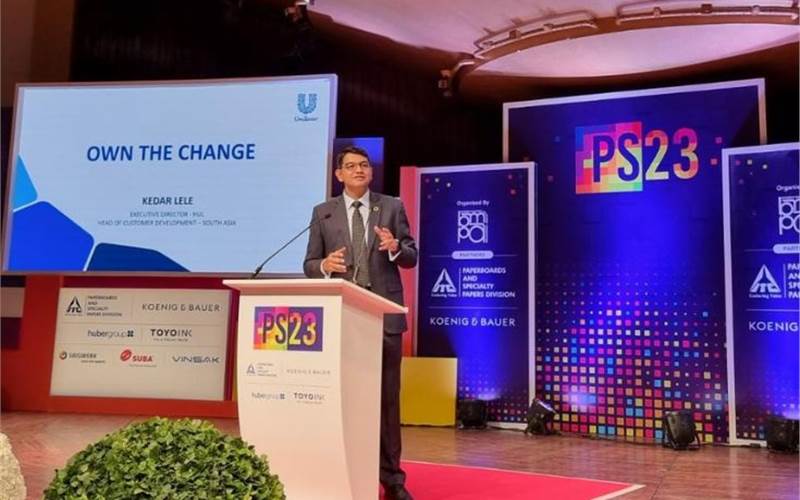Kedar Lele of HUL: If you have to survive, you got to be running
Kedar Lele, executive director and head of customer development at Hindustan Unilever (HUL), kicked off his keynote by sharing how HUL, which has been operating in India since 1880, has been able to do what it has been doing for the last 130 years – 50+ brands, 9-million outlets, 3,500+ distributors, 21,000 employees, managing 1.16-lakh tonnes of plastic waste, reducing carbon emission in its manufacturing and managing 1.6-lakh rural women micro-entrepreneurs.
16 Feb 2023 | By Noel D'Cunha
Lele said that the learning lessons here are very simple. "Whether you are an entrepreneur, a small company, a large conglomerate, or a multinational, the only way you can survive is by taking lessons from Africa. When the sun rises, whether you are a gazelle, or a lion, to survive, you got to run."
The story is: Every morning in Africa, a gazelle wakes up. It knows it must run faster than the fastest lion, or it will be killed. Every morning a lion wakes up. It knows it must outrun the slowest gazelle, or it will starve to death. When the sun rises, whether you are a gazelle, or a lion, to survive, you got to run. "And that's a metaphor for saying we got to be involved at all times. Because if you don't, you run the risk all the time of turning extinct," said Lele.
The local and global conundrum
People expect a multinational company to bring in the best from the world. That's only sometimes right, says Lele. "You could be mindlessly global, or you could be hopelessly local. The ability to strike a balance is what keeps you going."
Lele shares a famous quote from Harish Manwani, who used to say, we are a glocal company. We act global, but we think local. And that's very different from saying, We think global and act local. "That is what HUL does. We think local, means, act at scale, and act with quality, which could stand the test of time and scrutiny. And that's what keeps kept us going," explained Lele.
Speed of change
During his presentation, Lele shared examples of GE, Kodak, Nokia and blockbuster, which needed to catch up with the change.
"Multiple F1 drivers have echoed this. They believe that if the speed at which they're going at one place, at one point, their ability to command their making becomes much easier because they get comfortable with the speed of change, which is happening around them.," said Lele.
Lele went a step ahead and said that it is also important to understand and learn what shifts are happening in the industry. Lele bought an Apple watch because one of his friends who was using an Apple watch could call up the hospital helpline and get himself to the hospital in time. "Think about a watch on your wrist that tracks everything that the doctor would only be able to once you get to the hospital. And that data allows us to predict and be genuine that you will not feel well. All of us believe we are healthy until you're not."
According to Lele, with what Apple has done with the watch device, this innovative nature of technology could be the next frontier of economic growth.
Manage change
The new "Kodak moment" is when you realise that customer behaviour and preferences have changed so dramatically from your assumption that it's too late to change.
Lele shared an example of Xerox Parc, Palo Alto Research Centre of Xerox. It was established in 1970 in California. Steve Jobs, went to Xerox Parc and saw a mouse for the first time, Windows display and icons for the first time. Jobs invited engineers and said, I will give you an investment of a million-dollar in my company if you come and explain all of this to us. He commercialised what Xerox could never do. "Xerox had one of the largest numbers of patents in their name, yet it did not get picked up. That's because the focus was on technology, innovation and patents, not on the commercialisation of those things, not seeing how those patrons or those innovations could be applied to another industry," said Lele.
Talking about India in the last decade, Lele says we as a nation have managed to change. There was demonetisation, GST, and Covid-19. We survived and managed the change. "Covid is not happening in another part of the world. It was in your neighbourhood, and it was in your bedroom. Our behaviours changed. We started selling hand washers and sanitisers like nobody's business. People started washing hands five times a day, something that we've been telling them for 75 years, "said Lele, remarking in a lighter vein, "In the last year and a half, nobody's washing hands again."
Finally, Lele believes that India is the bright spot. "I don't need to tell you the story of India because all of us believe in it. We all believe the next ten years will be India's golden decade. We need to." Lele shared a case study of washing soaps and how the company introduced the liquid variant of the soap. He also said when the company faced challenges from the eB2B business, it launched its App to manage 2.2-million stores directly. Lele claimed HUL is one of the largest distributed businesses. "We felt that our classical distribution model would be challenged with the advent of the internet. Four or five years ago, we invented an app, which today is more than a million retailers use to order our products online directly, which we service through distributors," Lele explained.
Lele concluded by saying, there is a learning for all of us in the next ten years when the world around us closer home is changing. "Reinvent, don't get fossilised. Disrupt before someone else comes around and disrupts your big competitive advantage."













 See All
See All